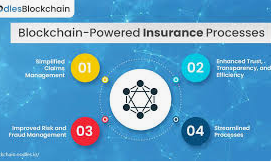Introduction
The insurance industry is on the cusp of a technological revolution, and blockchain technology is at the forefront of this transformation. Known for its secure, transparent, and decentralized nature, blockchain is poised to enhance security and efficiency in insurance operations. This blog explores how blockchain technology is being integrated into the insurance sector and the benefits it offers to both insurers and policyholders.
Brief Overview of Insurance and Blockchain Technology: Enhancing Security
Blockchain technology, often associated with cryptocurrencies, is a distributed ledger system that securely records transactions across multiple computers. In the context of insurance, blockchain can streamline processes, reduce fraud, and improve data transparency. By providing a tamper-proof record of transactions, blockchain ensures that all parties have access to accurate and up-to-date information, enhancing trust and security in insurance operations.
How Insurance and Blockchain Technology: Enhancing Security Can Help You
Integrating blockchain technology into the insurance industry offers several benefits for policyholders and insurers alike:
Enhanced Data Security
Blockchain’s decentralized nature and cryptographic security make it highly resistant to hacking and data breaches. This ensures that sensitive policyholder information remains secure.
Reduced Fraud
By providing a transparent and immutable record of transactions, blockchain can significantly reduce fraudulent claims and activities. Insurers can verify the authenticity of claims more efficiently, reducing costs and improving trust.
Improved Claims Processing
Blockchain can automate and expedite claims processing through smart contracts, which automatically execute and verify claims based on predefined conditions. This reduces the time and administrative burden associated with claims management.
Greater Transparency
Policyholders can access real-time information about their policies and claims, fostering transparency and trust between insurers and their clients. This also helps in resolving disputes more effectively.
Create a Tutorial on How Choosing the Best Insurance and Blockchain Technology: Enhancing Security
Choosing the best insurance provider that utilizes blockchain technology involves several key steps:
Step 1: Research Providers
Begin by researching insurance providers that have integrated blockchain technology into their operations. Look for companies with a proven track record of innovation and security.
Step 2: Evaluate Blockchain Solutions
Examine the specific blockchain solutions each provider uses. Consider factors such as the technology’s security features, its impact on claims processing, and its ability to prevent fraud.
Step 3: Compare Policies
Compare the insurance policies offered by blockchain-enabled providers. Evaluate the coverage, premiums, and additional benefits such as enhanced security and transparency.
Step 4: Consult Reviews and Ratings
Read reviews and ratings from other policyholders to gauge their experiences with blockchain-enabled insurance providers. This can provide insights into the reliability and effectiveness of the technology in real-world applications.
Step 5: Seek Expert Advice
Consult with insurance experts or brokers who understand blockchain technology. They can help you navigate the complexities of choosing a provider and policy that best meet your needs.
How Much Does Insurance and Blockchain Technology: Enhancing Security Charge?
The cost of insurance policies that leverage blockchain technology can vary widely depending on several factors, including the type of coverage, the provider, and the specific blockchain solutions implemented. Generally, the integration of blockchain may lead to more competitive premiums due to reduced administrative costs and fraud prevention. However, the exact cost will depend on individual circumstances and the level of coverage required. It’s important to compare quotes from multiple providers to find the best value while benefiting from enhanced security features.
Create Comparison About Insurance and Blockchain Technology: Enhancing Security
Here’s a comparison of traditional insurance policies versus blockchain-enabled insurance policies:
Traditional Insurance Policies
Traditional insurance relies on centralized systems and manual processes. While effective, these methods can be prone to errors, fraud, and delays in claims processing.
Blockchain-Enabled Insurance Policies
Blockchain-enabled policies utilize decentralized ledgers and smart contracts to automate and secure transactions. This leads to faster claims processing, reduced fraud, and enhanced data security. Policyholders benefit from increased transparency and trust in the insurer.
Write Benefits of Insurance and Blockchain Technology: Enhancing Security
Integrating blockchain technology into insurance provides numerous benefits:
Increased Efficiency
Blockchain automates many insurance processes, reducing administrative overhead and speeding up claims processing.
Enhanced Trust
With transparent and immutable records, policyholders and insurers can trust the accuracy and integrity of their transactions.
Cost Savings
By reducing fraud and administrative costs, blockchain can lead to more competitive premiums for policyholders.
Better Customer Experience
Real-time access to policy information and faster claims processing enhance the overall customer experience, making insurance more user-friendly.
Create Conclusion About Insurance and Blockchain Technology: Enhancing Security
Blockchain technology is transforming the insurance industry by enhancing security, transparency, and efficiency. As insurers continue to adopt and integrate blockchain solutions, policyholders can expect improved services and greater peace of mind. By choosing insurance providers that leverage blockchain technology, individuals and businesses can benefit from faster claims processing, reduced fraud, and enhanced data security. The future of insurance lies in embracing these technological advancements, ensuring that both insurers and policyholders are better prepared for the challenges and opportunities ahead.



